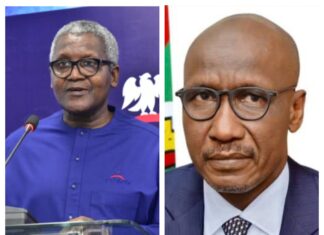It’s quite true that economists generally define inflation as too much money pursuing too few goods. This is technically known as demand-pull inflation caused by market forces of supply and demand. But there’s equally another important type of inflation called cost-push inflation, where prices of goods and services generally rise or fall in tandem with the costs of production.
By Tiko Okoye
Data recently released by the National Bureau of Statistics (NBS) shows, that among other things, Nigeria’s headline inflation rate increased on a year-to-year by a whopping 345 basis points to 20.52% from 17.07% as at August 2021. On a month-by-month basis, inflation rose by 88 basis points when compared against 19.64% in July. It also certainly didn’t help that the current inflation is the highest over a 17-year period dating all the way back to August 2005!
Although the hike in energy prices, such as Automotive Gas Oil (AGO), electricity tariffs and pump price of Premium Motor Spirit – while the chronic scarcity lasted – contributed significantly in pushing up the cost of transportation and production, the primary driver of this phenomenon was an escalating food inflation which quickened from 22.02% in July to 23.12% the following month amidst higher prices for staples such as rice and bread. Change in the prices of farm produce represented the highest sub-category in the period under review – a 38 basis points increase to 4.07% from 3.27% in July.
The primary focus of the Monetary Policy Committee, in a communique issued after a meeting on the 26th and 27th of September, was on curbing “the aggressive acceleration of inflation globally and how this had begun to retard growth in both advanced and emerging market economies.” Given this scenario and the prospects of “the build-up of increased spending and demand for money, as the 2023 general elections approach” with the likely adverse impact of such an ‘excessive’ money supply within the system, MPC members were fully persuaded that a great necessity was laid on them to wrestle the hydra-headed monster of inflation either to a pin fall or submission.
And the way forward for the MPC is to raise both the CBN benchmark Monetary Policy Rate (MPR) from 14% to 15.5% and Cash Reserve Ratio (from 27.5% to 32.5%). But would they achieve the desired results? I hardly think so.
A perusal of past communiques issued at the last five or so meetings since January 2022 is proof that the MPC has been sounding very much like a broken record by regurgitating the very same jeremiad: “The downtrend in global recovery aggravated by supply chain disruptions as a result of the Russia-Ukraine conflict and spillbacks and spill-overs from sanctions imposed on Russia by the US and its allies (and exacerbated by) an unprecedented rise and widespread global inflation which is (further thrusting) downward pressure on the fragile recovery of the global economy (amidst) lingering headwinds associated with the COVID-19 pandemic.”
The MPR has risen by a whopping 400 basis points between January and September (from 11.5% to 15.5%). Surely, if the same scenarios are still playing out today as nine months back, despite interest rate hikes, why still remain hell-bent on using the same tactic and expecting a different set of results? It clearly seems to me that what is missing here is the ability for creativity or the capacity to think out of the box.
Another point worth noting is that in virtually all its communiques, the MPC acknowledges that “the tightening of global financial conditions is expected to heighten investment and debt default risks, leading to the likelihood of a broad economic slowdown.” So, why then adopt the very same measures self-predicted to produce these deleterious effects on the economy? Is the MPC implying that its fear of an inflationary spiral is far greater than that of the full ramifications of a broad economic melt-down?
The apex bank is right to worry about a negative interest rate gap that acts as a daunting disincentive to savings/local investment and foreign domestic investment inflows in full compliance with the Fisher Effect. But I’m fully persuaded that the CBN is going about the matter the very wrong way. Surely, the CBN isn’t trying to tell us that its MPR – the interest rate it charges deposit money banks that need temporary funding bailout – is the same as the ‘nominal interest rate.’ No way, Jose!
It is the prime lending rate (PLR) – the rate at which financial institutions lend to their blue chip clients that actually approximates to the nominal interest rate – and this figure is way higher than the inflation rate at most periods in time, meaning that a positive real interest – as against a purported negative real interest gap – is already inbuilt! The major factor militating against the growth of longer-term savings and FDI inflows is the fixing of absurdly low interest rates on these instruments from a purchasing power parity perspective.
Imagine a typical bank charging PLR-plus-a risk premium to give an all-in-rate not usually lower than 25% on a 12-month credit facility, and then turning around to offer a take-it-or-leave-it 3% on a 12-month fixed deposit! The onus lies on the CBN to do much more in this regard.
As far as I can see, the recent tight monetary policy being implemented by the apex bank would produce the following effects: Further weakening of the value of the naira with its concomitant effect of pressuring costs of imports up; higher percentage of people living below the UN-prescribed threshold of $2/day, thereby unravelling virtually all the gains laboriously achieved by a plethora of poverty-alleviation initiatives over the past few years; and unemployment rate to hit new highs.
Other most-likely negative fallouts include: Bearish equities market to be considerably matched by a bullish bond market – mainly government development bond stocks – that would further ratchet up across-the-board interest rates; an obliterated manufacturing sector; (6) Stomping the high-flying MSME sector; ballooning loan defaults, rising non-performing loan portfolios and rendering many financial institutions unable to pass the stress test; and downward revision of projected GDP.
READ ALSO: Buhari presents 2023 budget to NASS on Friday
It’s quite true that economists generally define inflation as too much money pursuing too few goods. This is technically known as demand-pull inflation caused by market forces of supply and demand. The MPC’s restrictive money policy is geared towards curtailing pent-up demand so a lower equilibrium point can be attained at a much lower supply level and price.
But there’s equally another important type of inflation called cost-push inflation, where prices of goods and services generally rise or fall in tandem with the costs of production. This is really the type of inflation that afflicts the Nigerian economy as practically every item is dumped on our economy. For example, we are the only OPEC member-state that imports all its refined petroleum products from abroad since all four refineries have long packed up, hence the economy continues to haemorrhage from unsustainable ‘fuel subsidies.’
But since politicians typically lack the political will to make tough decisions, the apex bank finds itself saddled with the responsibility of implementing a restrictive monetary policy to rein in inflation by hiking interest rates. Unfortunately, the export manufacturing/processing sector that would’ve benefited most from the accompanying depreciation of the naira is practically non-existent. The Nigerian economy gains little or nothing from this kind of stimulus by being so heavily import-dependent. If only we haven’t been paying mere lip service to the ECOWAS Treaty on Trade and the African Continental Free Trade Agreement.
It is therefore imperative that the thrust of inflation management be shifted from demand-pull to cost-push. There’s the crying need to focus on significantly diversifying the nation’s revenue base, especially services and manufacturing-cum-agricultural processing as well as promoting an import-substitution economic development agenda. Unlocking access to credit at affordable pricing ought to be the hallmark of the MPC’s expansionist monetary policy, with growth stimuli targeted at specific areas.
Truth be told, just as it is impossible for a man to successfully make a snap with only the middle finger, the CBN should desist from becoming all things to all people and just focus on its statutory mandate. Many of its existing interventions are fiscal in nature and ought to be embarked upon by the Buhari administration. The Presidency remains the complementary thumb the apex bank sorely needs to work out what’s in the best interests of the Nigerian economy.
It bears repeating at this juncture that just like deficit budgeting inherently isn’t a bad idea as long as emphasis is laid on revenue-generating productive sectors of the economy, inflation ought not to be accorded the equivalence of economic leprosy as long as it is temporary and fosters a progression towards the attainment of full employment.
I can unequivocally state without fear or favour that just as with dispensing errors in medical practice, the CBN, in the matter of inflation management, steadfastly continues not only dispensing an incorrect medication, dosage strength or dosage form, it is also incredibly failing to appropriately identify policy interactions or contraindications. It’s indeed a miracle that the economy hasn’t been rendered totally comatose over the years more by the prescribed remedies than the actual disease!















